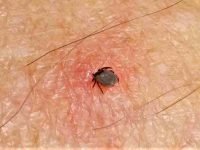This post contains affiliate links. If you click on a link and make a purchase I earn a commission at no extra cost for you.
Cats are special animals, they love to roam the outdoors all year. But during tick season from early spring to late autumn those nasty little bloodsuckers can easily bury themselves into your cat’s fur and bite your pet to suck blood. Use Tick Repellent for Cats to reduce the risk of a tick bite on your cat and regularly inspect your cat’s fur. As the tick needs some time until it finds a proper bite site, you may find the arachnid before it bites your pet. If it’s too late, you should remove the tick as soon as possible.
Cats are sensitive towards certain tick repellents as their metabolism differs from other mammals.
Only use tick repellents for cats that are specially made for and safe to be used on cats.
Natural way to repel ticks on cats
Natural tick repellents for cats are popular with many cat owners. Although natural repellents are not quite as effective as chemical tick repellents, they reduce the risk of tick infestation and thus also the risk of tick bites.
A tick collar can keep ticks away from your cat. The advantage of tick collars is that they usually last longer than spot-on preparations.
Naturally occurring substances derived from plants can be used as active ingredients in Collar for Flea and Tick Prevention, making it possible to dispense with synthetically produced active ingredients.
Natural tick repellants work through a mixture of different natural essentials oils in low concentrations are usually well tolerated by cats. Ensure that the tick remedy is labeled as appropriate for cats!
Ticks avoid the odor of these substances which are slowly released by the collar. Tick collars have the advantage of the cat not being able to lick it, as could be the case with topically applied spot-on preparation. However, not all cats like a collar around their neck.
No products found.
Natural Spot-On Tick Repellent For Cats
To protect your cat against ticks, there are also special spot-on preparations for cats available.
They repel ticks and fleas with the help of essential oils in low concentrations which have a deterring effect on the parasites.
The active ingredients spread slowly over fur and skin and work as an effective tick repellent. Whatever tick repellent control you use, cats should still be checked regularly for ticks.
No products found.
How To Use Spot-On In Cats?
Spot-on tick protection preparations for cats are very easy to use. Simply apply with the enclosed pipette on a spot where the cat cannot lick its fur, such as in the neck or between the shoulder blades. During treatment, care must be taken that no other animals living in the household lick the product off.
The active ingredient contained in the spot-on preparation is repelling for the tick. Repellents prevent the parasite from recognizing the cat as a host and thus prevent an infestation so that the cat is not bitten at all.
To ensure reliable protection against ticks, the spot-on must be applied regularly as per instructions.
Alternative Natural Tick Remedies
Coconut oil
This is a safe, and natural tick repellent for cats which also protects against fleas and other parasites. It contains Lauric Acid, which keeps ticks away from your cat. Coconut oil is not harmful to cats and you can not really overdose it. Rub a small amount of coconut oil in the cat’s neck, head, ears, and back. Repeat the procedure, depending on the frequency of tick infestation every 3-4 days. If your cat licks it and it gets into the organism of the cat, it has a positive effect on the intestinal flora as it also protects against worms.
Brewer’s yeast against ticks and fleas
Brewer’s yeast as an addition to the feed or in the form of tasty treats should also help to ward off ticks. The yeast changes the cat’s skin environment so the pet “smells bad” for ticks. Don’t worry, your cat doesn’t mind the smell and we humans don’t notice it.
Brewer’s yeast is an effective home remedy for ticks because it is in no way harmful. It is high in vitamin B, which is good for its coat and skin, and your cat gets a healthy shiny coat. Mix in feed as per instructions.
Garlic against ticks
Some feed garlic to their cat, however, the cat may not readily eat garlic. Mix a crushed toe in a little cottage cheese or yogurt, the chances of success are already larger.
Alternatively, one can also slightly squeezed garlic juice into the neck of the cat. There are also commercially available tablets or pastes with garlic extracts.
Amber Necklaces
Some people believe Amber Beads in the form of a neckless to protect cats and dogs from ticks. Amber is said to repel ticks by an electrostatic field that builds up by rubbing the amber on the fur of the animal. However, the deterrent effect of amber necklaces against ticks could not be detected in tests.
Preventing Tick Infestation in Cats
- Keep on checking for the presence of ticks on the body of the cats. Once you find ticks on the cats, it is best to remove them immediately.
- If the cat permits, occasional bathing should be implemented using special cat shampoos to kill any ticks on your pet.
- Consider using natural tick repellents on your cat in a regular manner.
- The best way to safeguard the cats from ticks is, to use tick collars and tick powders, or other spot-on preparations. Use natural remedies as a continuous prophylactic and use highly effective chemicals to clear an acute infestation.
- You may use tick sprays, in the case of the non-working capability of the shampoos, carefully spray onto the cat’s fur. Care should be taken near the cat’s face.
- An efficient way to protect the cats from ticks is, to keep your house and yard (reduce ticks in your yard ) tick-free by removing tick hiding places where possible as well as planting tick repellent plants.
Keep in mind that even a natural tick repellent can cause unwanted side effects in cats. The effect of natural home remedies against ticks in cats may not be complete. Use only such preparations that are labeled as suitable for cats. If you have questioned whether the application is safe, treatment with natural tick remedies should be discussed with a vet.



